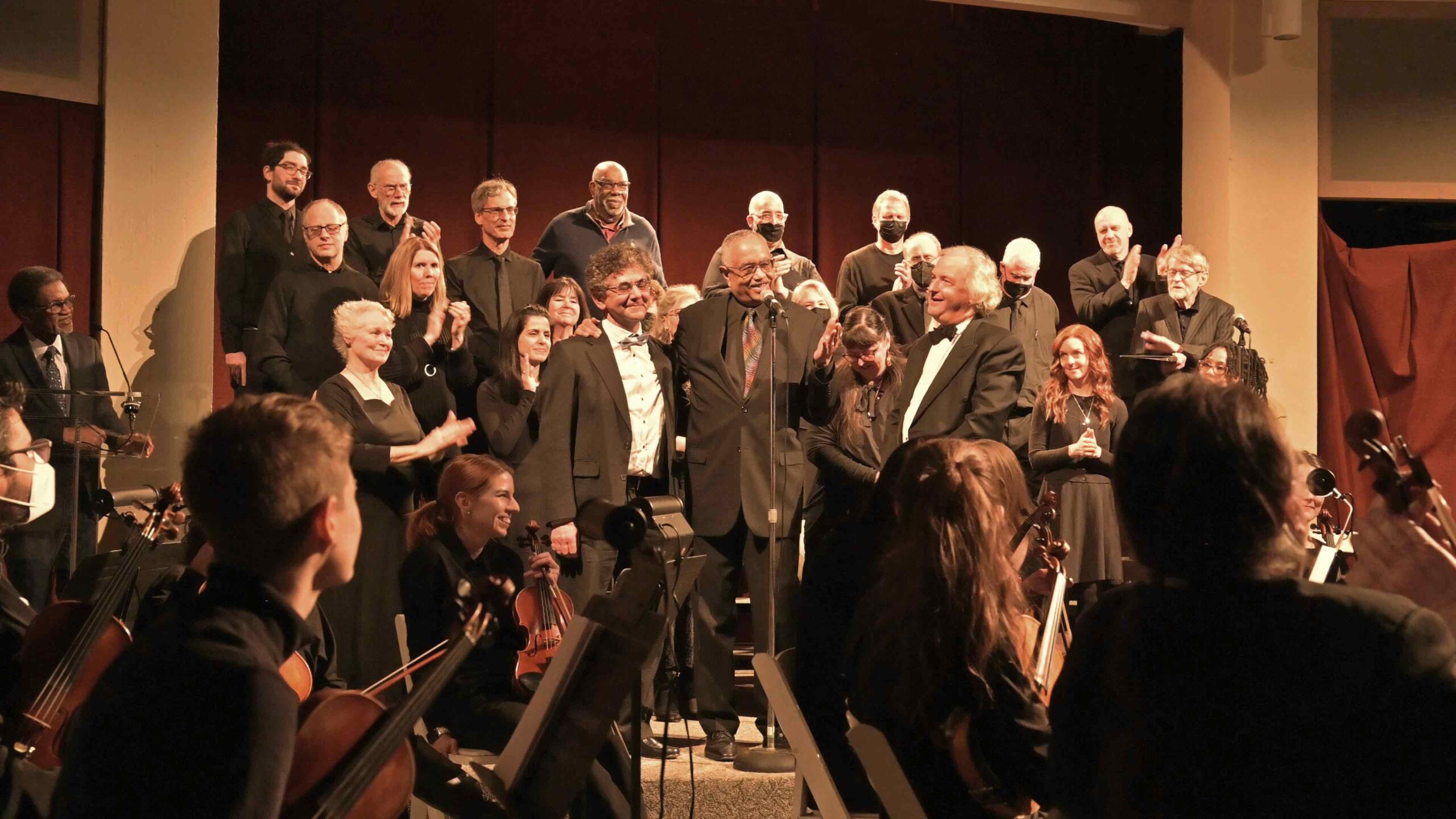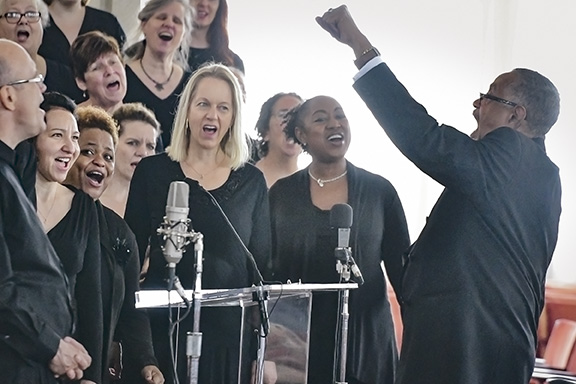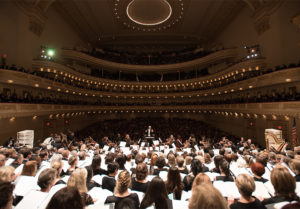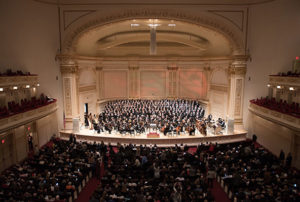



On the Sunday after Thanksgiving, 62 singers coached by Van Gilmer, Music Director of the Baha’i House of Worship, will assemble with other musicians from around the world in a performance of Handel’s Messiah at Carnegie Hall in New York City.
“We are now frantically working on the nine pieces we will sing for the Messiah,’” says Gilmer who is hosting advance rehearsal time for singers who live near the House of Worship in Wilmette, Illinois. Gilmer is also coordinating with Baha’i singers from across the country and from a few other countries who will meet in New York.
The Baha’i contingent — one of the largest to participate in the event — will be part of a massed choir performing the first half of the towering work by George Frideric Handel; a similar choir will perform the second half. Eighteen faith communities in all are contributing about 250 singers this year.


The invitation to participate came to Gilmer nearly a year ago after event coordinators at Distinguished Concerts International New York City saw YouTube videos of the Baha’i Festival Choir performing the best-known piece from the Messiah, the “Hallelujah” Chorus.
“At first, I was overwhelmed by the invitation and not certain if it was real,” Gilmer said. “Once I read about these annual concerts, I immediately started to see if I could gather enough of the past Baha’i Choral Festival Choir members to join with the Baha’i House of Worship Choir to be able to commit to this very special invitation.”
The spring 2018 festival became part of the preparation. That program included two sections from Handel’s oratorio: “All We Like Sheep Have Gone Astray” and “And the Glory of the Lord,” giving a head start to many of the singers who plan to participate at Carnegie Hall.
For the annual festival — as for other public performances — Gilmer requires singers to memorize their parts, an unusual and often remarked-upon feat for the choristers. For the Carnegie Hall event, however, they will be using sheet music.
“It, of course, will be different for our choir to sing with the scores,” Gilmer said, “but everybody feels relieved to know that we will not have to memorize the nine choruses that we will sing during the first half of the concert.”
Another difference is that music in the Auditorium of the Baha’i House of Worship is always a cappella, without instrumentation. The singers at Carnegie Hall will be accompanied by a 100-piece orchestra.
Conductor Dr. Jonathan Griffith will conduct the 1959 re-orchestration by Eugene Goossens. The performance, which in years past has played to sold-out audiences, takes place in the soaring 2,804-seat Isaac Stern Auditorium.
The singers will spend five days in New York City, with “approximately 9-10 hours in rehearsals,” said Griffith. The concert organizers will also be hosting a farewell gala dinner for the participants.


Carnegie Hall, a National Historic Landmark, is named after philanthropist Andrew Carnegie, who funded its construction in midtown Manhattan. It is one of the most prestigious venues in the world for both classical and popular music, and since its opening in 1891, musicians the world over have aspired to sing there.
It will be Gilmer’s third time singing in Carnegie Hall. “I had never imagined that I would appear on the Carnegie Hall stage,” he said.
“The first time I sang in Carnegie Hall was in 1992 with a group of 40 specially chosen Baha’i singers for the official opening of the Second Baha’i World Congress. It was an honor in many ways.”
Ten years later, he was a featured soloist with the Voices of Baha, an international Baha’i touring choir under the direction of Tom Price. “This time, I sang the solo for “Amazing Grace” with the 200-voice choir.”
So how is he feeling about his third appearance? Still excited. And he is also happy to facilitate bringing other singers to Carnegie Hall. “It is so special to sing on this, one of the finest stages in the world. I’m also a little bit anxious about my group getting the music right.”


One singer joining Gilmer is Deborah Good-Krochock, a member of the Baha’i House of Worship Choir who regularly sings with the spring Choral Music Festivals. A French and Spanish teacher who enjoys singing in many styles, Good-Krochock went to Paris last year as a participant in the Chicago-Paris Cabaret Connexion Singer Exchange and took master classes. She also took part in a choir assembled in 2016 for the dedication of the new Baha’i House of Worship in Santiago, Chile, and sings for monthly Spanish-language devotions at the Temple in Wilmette.
Good-Krochock said she is excited about the trip. “I love the energy of New York. I am ecstatic about the chance to join with singers from around the world in performing the Messiah at Carnegie Hall.”
Learning the music for the Messiah, she said, presents some special challenges. “The music is very intricate and requires lots of agility in mastering the complex runs. There are several musical motifs that keep popping up where you think that something is being repeated, yet it is changed by only a note or two, making it very hard to master.”
Handel composed the English-language oratorio in 1741 for a modest number of singers and a small orchestra. After his death, the work was adapted for giant orchestras and choirs. It has been revised frequently, with recent trends favoring a greater fidelity to Handel’s original intentions.
Although its structure resembles that of opera, there is no dramatic action or direct speech. Instead, the text is an extended reflection on Jesus as the Messiah called Christ.
Part I begins with biblical prophecies by Isaiah and others, and moves to the Annunciation to the shepherds, the only passage taken from the Gospels. In Part II, Handel concentrates on the Passion and ends with the “Hallelujah” chorus. In Part III he covers the resurrection of the dead and Christ’s glorification in heaven.
These passages take on additional significance for Baha’is who understand that their inherent prophecies also apply to Baha’u’llah, Founder of the Baha’i Faith.
“While most people generally associate the holy scriptures of the Bible with the Messiah,” said Gilmer, “they seem to Baha’is to announce the coming of the Messenger of God for this Day Who is Baha’u’llah, Whose Arabic name means the Glory of God.”
Gilmer points out lyrics relating to Baha’u’llah. “We will sing ‘Glory to God in the Highest,’ ‘And the Government shall be upon His shoulders,’ ‘the King of Kings,’ ‘the Lord of Lords,’ ‘Blessing and Honor, Glory, and Power be unto Him, Amen’.”
For more information visit Distinguished Concerts International New York


![]()
![]()
Whether you are exploring the Bahá'í Faith or looking to become an active member, there are various ways you can connect with our community.
Please ensure that all the Required Fields* are completed before submitting.